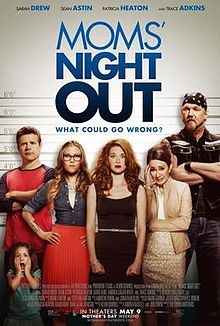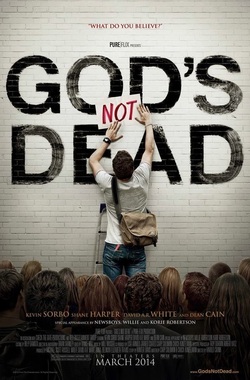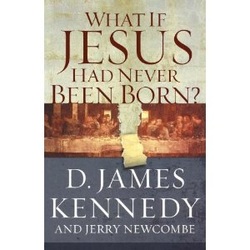Of course, there are times indeed where mothers desperately need a night out away from the very busy and difficult world of being a homemaker (I believe it is truly one of the most difficult jobs in the world).(2)
And as husbands are supposed to support their wives in those times (Col. 3:19; 1 Pet. 3:7), it certainly follows that they can (and should) provide such a night out for their wives at times (I'll not get into the frequency in this review). ;) But thus begins the plot and my corresponding review of this wonderful movie....but don't worry, I won't have any SPOILERS in the review. For godly grief produces a repentance that leads to salvation without regret,
While non-graphic, I still caution you on watching the video because you're in essence witnessing a murder. But I probably suggest you read the article (which has the same message as the video but just goes into more detail of the background), in that this post will basically just be responding to it.
The first question I had after reading the article is how does a Christian respond to something like this? Well I'm sure there are many Biblical ways to respond. For my part, there were two main things that stood out to me, her neglect of the child's perspective, and her misunderstanding of the nature of guilt. Each book is summarized briefly, followed by an analysis on the trilogy as a whole. WARNING: SPOILER ALERTS THROUGHOUT!
"But this book says nothing about Jesus..."
You're absolutely correct. The author does not bring this point up explicitly in the books (and for my part I really don't know what the author's worldview is or her understanding of who Jesus Christ is). But it comes out nonetheless, like it would in any dystopian work; and it would be good to point this out when reading it with others (especially your children). Whether it was intentional or not, I think it is very telling that Jesus Christ is not mentioned at all, or even anything resembling the idea of Christ's church. It is in this Christless world of Panem, where the Hunger Games take place, that we get a very good picture of what society truly is like when there is no restraining force of God on earth. Let's consider the story then...
And I assure you, it's not my intent to go around nitpicking at the errors (or perceived errors from my perspective) of other Christians - especially of Christian men who are such wonderful leaders, deserving of our utmost respect (1 Thess. 5:12; Heb. 13:7, 17)!
At the same time though, when they so blatantly - all in one accord - give such a dogmatic answer that is built on such shaky ground, I don't know what else to do than to address it.
Is God's Not Dead a movie worth seeing?
No...not really. The acting wasn't that great. I mean, there were one or two who could make it as Hallmark movie actors; but other than that it was pretty terrible. The characters were mostly absurd caricatures. From the "feel-good" aspect, there were various sub-stories within the film that they tried to bring together for a big "Awe..." moment. But the characters were so flat that it doesn't really make you feel anything, other than the wonderment of why you watched this film in the first place. The film was way over dramatic at points (many points), appealed drastically more to feelings than to reason (pretty annoying given that the thrust of the movie was supposed to be rational debate in a philosophy class), and very weak even in its evangelistic moments. Book Review: What If Jesus Had Never Been Born? The Positive Impact of Christianity in History1/11/2014
In the introduction the book posits the problem: We live in an age in which only one prejudice is tolerated -- anti-Christian bigotry. … Today, the only group you can hold up to public mockery is Christians. … But the truth is: Had Jesus never been born, this world would be far more miserable than it is.
So dare we even attempt to make a resolution?
To give the word its appropriate meaning it would have to be something we are sure we can, and indeed are determined we will, do. But in this flesh, knowing our sin nature, knowing that whatever plans we might have, they could at any moment be interrupted by the gracious and powerful God who rules the world (Prv. 19:21) - knowing all this, what can we be resolved to accomplish in the this next year? Can or even should we be resolved to accomplish something this next year?
other place), presents under a tree (that’s inside our house?) decorated with lights and ornaments, or a story about some magical guy in a sled with elves and reindeer delivering presents to children all over the world in one night have anything to do with the real reason for celebrating Christmas?
But on the other hand, it’s hard not to participate to some degree in these things; because once you’re categorized as a scrooge, the world really won’t listen to you anymore this time of year(1). There are many perspectives on this, and I’m certainly not going to try to state (or even claim to state) the Biblical perspective. But I wonder if at least one Biblical perspective is that it’s not all that bad, in part, to embrace the cultural concept of receiving gifts this time of year. And I say receiving rather than giving for a specific purpose. And I get it; a clarification is in order: Of the two titles below, which do you think would be more likely to lead your children away from the Christian faith? Which would be more likely lead you away from the Christian faith?(1)
Obviously the answer might be very different depending on where you (or your children) are in the Christian walk already. And it would also depend on each individual's own areas of particular temptations.
But one thing I do think we ought to be cognizant of is that neither one of these is done with the specific purpose of building us up in the faith. And both of them need to be evaluated with scrutiny through a Biblical lens - for even Satan disguises himself as an angel of light (2 Cor. 11:14-15).
But a sad truth it is. The truth that fallen man, no matter how intelligent, how idealistic, how “good”-intentioned, how perceptive, or even how super, man is not and cannot be the savior, either of himself or anyone else. And in one of the most creative forms of depicting this reality, the story that Watchmen tells is fantastic.
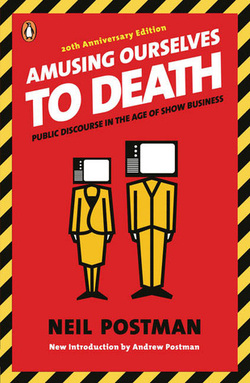 A Paradigm Shift in Our Understanding of Communication Although there's definitely a temptation for us to amuse ourselves to death with things that have always had the intent of amusement (sitcoms, dramas, sci-fi, fantasy, etc), Neil Postman has nothing bad to say about "junk television" (as it's called in the introduction). Rather, his very compelling argument is that we're turning into a society that will amuse itself to death because our capacity to comprehend and act on things is transforming into one that only operates on amusement itself. In other words, it's not that we make things for the sake of amusement that will hurt us, it's that we now make everything - even things that are not meant to be amusing - into a venue of entertainment.(1) While originally published in 1985, I sincerely think this book is just as relevant today (in the age of Google, Youtube, Facebook, and Twitter)* if not even more so than when it was first penned. Postman takes the reader through the history of our mediums of communication and shows (and I mean, really shows from history) that when our culture of communication started to turn from the printed word to visual images, our capacity to think through things cogently had started to drop significantly. Our attention span has taken a terrible plummet. And even our humanity has been desensitized to a degree. On 2/28/13 Steve McSwain was published in the Huffington Post's Religion section with the following article:
6 Things Christians Should Just Stop Saying The list is pretty straight forward, although he does some lengthy elaborations on some of the points. But in summary, here are the six things which a fellow(?)-Christian(1) says all other Christians really need to stop saying:
While I wanted to respond back then, I didn't really have a forum to do so; and I also didn't really have the time until just recently (preparing for the birth of our daughter, learning how to be a Dad to a newborn, going through an unexpected job change, etc.). Nonetheless, now that I do have time, I'd like to do something of my part in protecting (or encouraging) the flock, and give (by God's grace in me) what I believe is a Biblical response. 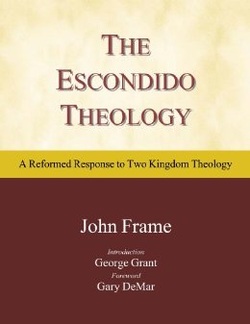 A Biblical Response to Two Kingdom Theology Here is a very interesting but very important work by Dr. John Frame. The book consists basically of several very long, very thoughtful book reviews of authors who've come from the Westminster Theological Seminary in Escondido, California. Based on the works they've produced Frame makes a very compelling case that they've developed their own "version" of Reformed theology particular just to the Escondido school. Unfortunately, as Frame goes on to show, their "version" is not truly standard Reformed theology. Furthermore, when seen through a Biblical analysis, it is at many points unbiblical theology. Taking on about a half dozen authors (including such authors as Michael Horton, R. Scott Clark, David Van Drunen, Meredith G. Kline, and Darryl Hart), Frame shows review by review how their particular outlook is simultaneously (1) not in line with standard Reformed theology, (2) particular only to the Escondido school, and (3) not at all a truly Biblical outlook. The main common denominator between the Escondido proponents is their "Two Kingdom Theology" whereby they teach in essence that it is not the church's responsibility or call to try to influence culture or society much in any way. While the exact opposite of this can be seen throughout Frame's Theology of Lordship series (and many other Reformed works by other Reformed theologians and teachers), in this work he makes a very concise application of that theology by reviewing selected works of these Escondido authors. 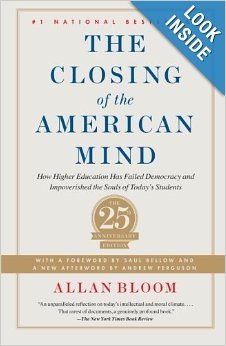 I think I understand why this book got such raving reviews at its publication in 1987. Allan Bloom certainly documents his acute observations on how our society moved from one that had absolute standards to a society where everything is relativized and the only thing absolute is the maxim that all views are equally valid (except the view that holds that not all views are equally valid). Through the book, Bloom takes the reader on a journey through three main sections: Part One: Students Part Two: Nihilism, American Style Part Three: The University While some places are easier to understand than others, throughout the book I was constantly scratching my head either because of a criticism he gave that offered a lot to think about or simply because he used such high-minded language I had no idea what he said. I was reminded of a book published 11 years earlier called Foundations of Christian Scholarship, where the contributors' aim was to write for upper division college students and graduate students with the caveat that "If Christians had done their work properly in the field of private Christian education, these essays would be geared for high school seniors, or at the most, college freshman." That was in 1976. I would venture to guess even upper division college students and/or graduate students would have a hard time with the book at this point (although I will say it was still easier than Bloom's). |
Categories
All
|
